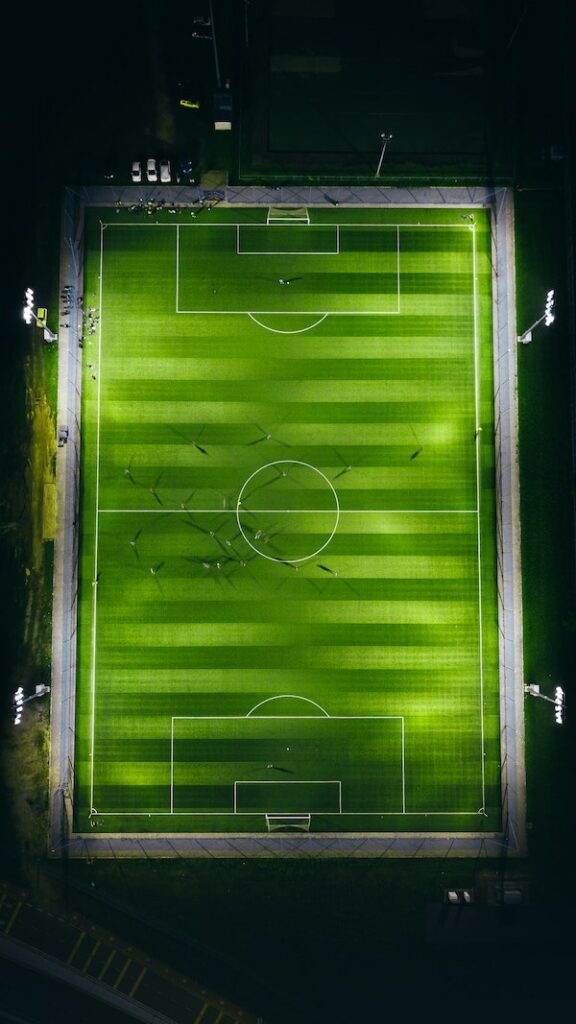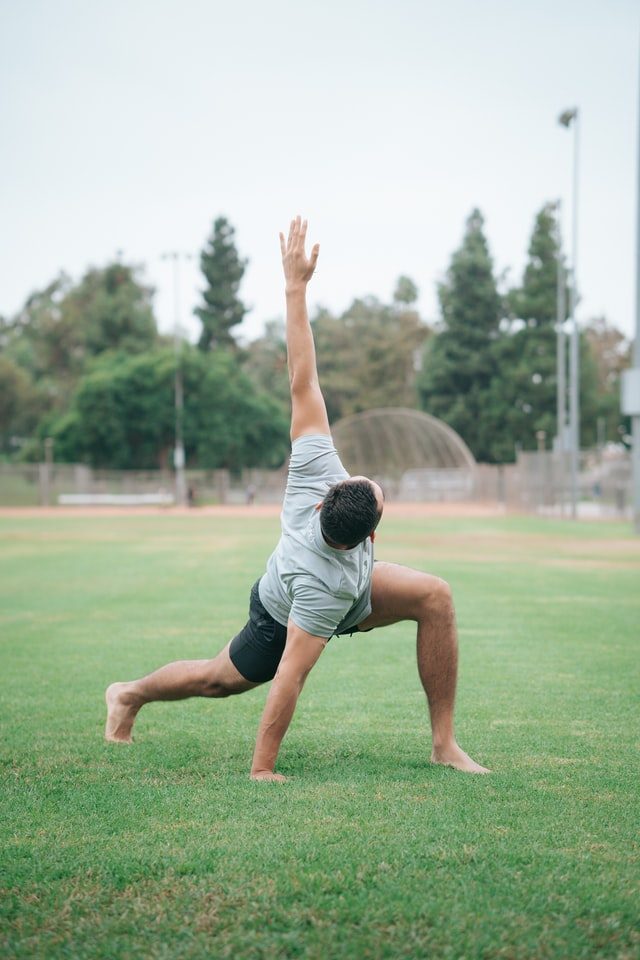From the introduction of a video assistant referee (VAR) since 2016, to an ever-increasing number of matches being played to make money from selling international broadcasting rights, recent choices have undoubtedly impacted the sport for the worse.
Ideally, technology would be used to improve the quality of the action, without having a detrimental effect on the players, or the integrity of the game itself.
What’s the current relationship between football, technology and mindfulness, and are cracks beginning to show as the ante is constantly upped each season?
Examples of Soccer and Technology
We’ve moved on from the days of jumpers for goalposts, especially when looking at the highest levels of the professional game.
Technology has played an increasingly important role in this progression, as teams aim to extract any and every advantage they can in an effort to stay one step ahead of the competition.
For example, most players wear high-tech GPS trackers to record movement, average speeds, heart rate and a variety of different stats at the same time. There’s now technology inside the ball itself to provide better precision, while referees have a monitor they can refer to for contentious decisions.
Everything from diets to personal habits have changed over the past two decades, as stringent professionalism has set in at every level.
Coverage has also improved for supporters, with multiple camera angles that can be changed at any time by the viewer, along with VR capabilities and smart cameras.

Mindfulness, Mental Health and Addiction
It’s easy to say that players are paid handsomely. That they should be able to deal with the pressure of the modern game. However, they’re only human, and cracks are beginning to show for a significant number.
464 members of the Professional Footballers’ Association accessed counselling services in 2020, which means numbers have quadrupled since 2016. As the PFA has 4,000 members, that means that over 10% sought some form of support. [Editor’s note: a reader pointed out that this doesn’t necessarily indicate mental health problems are increasing amongst footballers – it may instead be that counselling is becoming more accepted within football culture, and this should be celebrated. Good point!]
Then there are reports that there has been a rise in addictions to sleeping pills, along with various prescription meds that wouldn’t come up under stringent drug screening.
There’s also a notable rise in gaming addictions, as players look to alternative methods to wind down.
An ever-increasing schedule of games isn’t going to help, especially if it’s solely to make owners more money.
Manchester City and England star Raheem Sterling became an ambassador for meditation app Headspace in November 2021, saying;
Meditation is a practice I have benefitted from greatly as a professional athlete, supporting me in balancing my thinking, focusing, and diminishing external noises, especially during the summer’s UEFA EURO ‘20 tournament.
It should help to destigmatise mental health issues, which are often ignored within the game.
Yoga has long been used to improve flexibility, but players may be better off using those techniques to improve mindfulness. The same goes for managers and coaches, who are under even more pressure than the players as they’re more expendable.
Even the frantic Antonio Conte admitted that he likes to read up on yoga and “seeks moments of respite with stretching exercises and a few minutes of mindfulness” while he was Chelsea boss.

Should Technology Be Banned?
Should the use of new technology be banned from football? It wouldn’t be the first time that a sport has been pared back with a view to ensure fairness.
Take FINA, who banned the use of high-performance swimsuits in 2010. Since their introduction in 2008, there were almost 200 world records broken, while many still stand over a decade on from the decision.
Then there’s World Athletics, who amended its rules governing competition running shoes in 2020. They noted;
The Assistance Review Group has concluded that there is independent research that indicates that the new technology incorporated in the soles of road and spiked shoes may provide a performance advantage and there is sufficient evidence to raise concerns that the integrity of the sport might be threatened by the recent developments in shoe technology.
This came after Nike Alphafly shoes took 31 of the 36 podium positions at major marathons in 2019, thanks to carbon-fibre plates that vastly improved performance and overall speeds.
The point is, technological doping isn’t an especially new concept, and progression at the expense of true competition ruins the spirit of the game.
Where to Start: VAR, Broadcasting Rights
Of the many recent technological advancements in football, nothing has affected the sport more than the Video Assistant Referee (VAR), and the rising importance of broadcasting rights.
You’d think video footage would help to make issues less contentious, although the English Football Association freely admits that;
“VAR will not achieve 100 per cent accuracy, but will positively influence decision-making and lead to more correct, and fairer, judgments.”
In other words, there’s still an element of human error, which is to be expected given it’s still down to a referee and their personal bias. However, it’s hard to deny that VAR hasn’t been a hindrance in many respects.
A total of 128 goals or incidents were directly affected by the video referee in the Premier League in the 2020-21 season, including a trio of penalty mistakes made on the same day.
It’s not exactly a fan favourite, and would be a good place to start if the aim is to remove unnecessary tech.
Then there’s the World Cup, and FIFA’s biennial proposal. They want to stage the tournament every two years, instead of four, although they’ve faced opposition from sponsors and the International Olympic Committee.
The governing body of European football, UEFA, has also strongly opposed the proposal, as it would clash with their continental tournament.
Essentially, it would double the number of games played, stretching footballers even further as they will have to perform in more high-intensity matches with little respite.
Almost one-third of football-related injuries are caused by overuse, while research shows;
Injuries occur primarily during the initial or final 15 min of the match, indicating the significance of an appropriate warm-up and the effects of fatigue on players.
Maybe the increased schedule is the reason why FC Sheriff star Adama Traore collapsed to the floor while clutching his chest in worrying scenes against Real Madrid in November 2021.
Then there was Denmark’s Christian Eriksen, who collapsed on the pitch during a Euro 2020 game against Finland, having suffered a cardiac arrest.
Of course, more games equals more matches on TV, which makes more money for the likes of FIFA. (They’ve already expanded the World Cup from 32 teams to 48 starting at the 2026 tournament.)
The Commodification of Soccer and Technology
It’s been a while since the biggest football clubs were viewed as anything more than a business by owners, unless it’s an attempt at “sportswashing”. (That’s when an owner/investor uses a sport to improve their public image.)
Take the The 2021 takeover of Newcastle United, which led fans to ‘chant and wave the Saudi Arabian flag’ following news that the richest man in the world had taken over their club.
The commodification of the game has been a long process, and there’s little community spirit to be found at the top of the footballing pyramid. Technology has fuelled this progress, and it almost always boils down to an attempt to maximise revenue streams, often via inflated broadcasting deals that see more games played.
The tech itself isn’t to be blamed, since it’s the nature of competition under capitalism. (If your opponent has more resources, it makes sense to use anything possible in an attempt to close the gap.)
Soccer, Tech, and Mindfulness
It does seem like an element of fun has been removed from the game in recent years, as players switched to being athletes first to suit a busier schedule, with their every step recorded for statistical purposes.
Fans are also to blame, as we lap up any and every match without fail from the comfort of our own homes, even if the players (and the overall quality of the football) suffer as a consequence.
To answer the question posed at the beginning, modern technology isn’t necessarily ruining football.
It has impacted the game to great lengths in recent years, but that’s to be expected as a byproduct of modernisation.
However, a stat-driven approach has caused issues for players and fans, while the use of technology is a hindrance in many respects.
Top players are supposed to practice mindfulness by being in the moment, but growing numbers are turning to counselling, or even illegal substances in a bid to keep themselves going with longer schedules and no breaks.